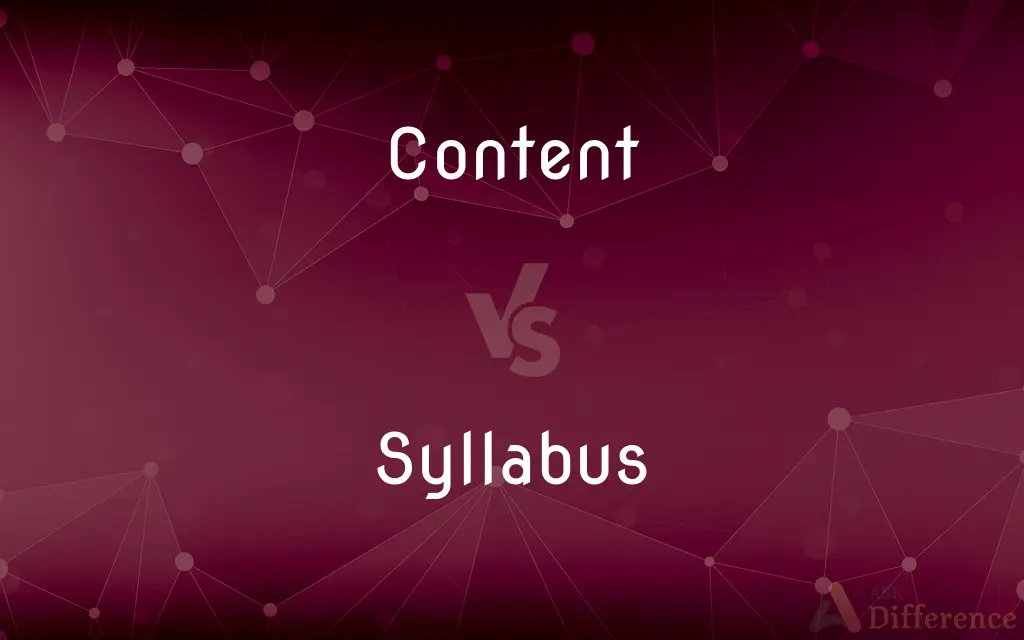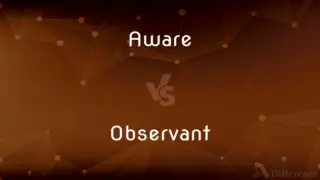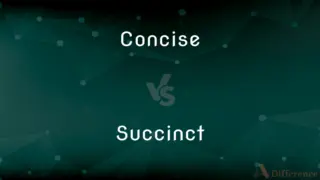Content vs. Syllabus — What's the Difference?
By Fiza Rafique & Urooj Arif — Updated on March 6, 2024
Content refers to the substance or material covered in a course, while a syllabus is an outline or document detailing the course structure, topics, and policies.

Difference Between Content and Syllabus
Table of Contents
ADVERTISEMENT
Key Differences
Content encompasses the material, topics, concepts, and information taught in an educational course or training program. It represents the breadth and depth of knowledge that the course aims to impart to students, including lectures, readings, multimedia resources, and activities. On the other hand, a syllabus is a formal document provided at the beginning of a course that outlines the course's structure, including the list of topics (content), assessment methods, schedules, textbooks, and policies regarding attendance, grading, and academic integrity.
While the content is the substance of what is being taught, the syllabus serves as a roadmap or guide for both instructors and students, outlining how the content will be covered, the expectations for students, and the framework within which the course will operate. In this way, the syllabus acts as a contract between the instructor and the students, setting clear expectations for the course duration.
The development of content involves curating and organizing information, knowledge, and skills that align with the course objectives and learning outcomes. It requires selecting relevant topics, designing engaging and effective learning activities, and choosing appropriate assessment methods. Conversely, creating a syllabus involves planning the course structure, scheduling, and policies to ensure a coherent and manageable progression through the content over the academic term.
Content can vary widely across different courses and subjects, reflecting the diversity of knowledge and skills in various disciplines. It is dynamic and can be adapted or updated based on new research, feedback, or educational goals. Meanwhile, the syllabus, while also subject to updates, primarily provides a stable framework for the course, detailing how the content will be explored and assessed throughout the term.
Despite these differences, content and syllabus are closely interconnected. The syllabus is designed based on the course content, aiming to effectively structure and convey this content to students. Both are essential components of educational planning and delivery, contributing to a comprehensive and effective learning experience.
ADVERTISEMENT
Comparison Chart
Definition
The substance or material covered in a course.
An outline or document detailing the course structure and policies.
Purpose
To impart knowledge and skills to students.
To guide students and instructors through the course, setting expectations.
Components
Topics, concepts, information, activities.
Course structure, topics, assessment methods, schedules, policies.
Development
Involves selecting and organizing knowledge and skills.
Involves planning course structure and policies.
Variability
Dynamic, can be updated based on new insights.
Stable, provides a consistent framework for the course.
Compare with Definitions
Content
Material designed to convey knowledge and skills.
Course content is accessible through the online learning platform.
Syllabus
Serves as a contract between the instructor and students.
The syllabus sets out the expectations for attendance and participation.
Content
Reflects the depth of knowledge in a specific subject area.
The advanced course’s content delves into theoretical and applied aspects.
Syllabus
Lists the scheduled topics and assignments for the course.
According to the syllabus, the midterm exam covers the first five chapters.
Content
The topics and information taught in a course.
The content of the biology course includes cellular biology and genetics.
Syllabus
A document outlining the course's structure, including content and policies.
The syllabus details the grading criteria and reading list for the semester.
Content
Subject to updates to remain current and relevant.
The course content is updated annually to include the latest research findings.
Syllabus
May include information on textbooks and required materials.
The syllabus specifies which edition of the textbook students need to purchase.
Content
Can include various formats such as text, video, and interactive activities.
The content includes lectures, quizzes, and group projects.
Syllabus
Outlines the policies on grading, attendance, and academic integrity.
The syllabus contains a section on the university’s policy against plagiarism.
Content
Often contents Something contained, as in a receptacle
The contents of my desk drawer.
The contents of an aerosol can.
Syllabus
A syllabus (; plural syllabuses or syllabi) or specification is a document that communicates information about a specific course and defines expectations and responsibilities. It is generally narrower in scope than a curriculum.
Content
The individual items or topics that are dealt with in a publication or document
A table of contents.
Syllabus
The subjects in a course of study or teaching
The history syllabus
There isn't time to cover the syllabus
Content
The material, including text and images, that constitutes a publication or document.
Syllabus
(in the Roman Catholic Church) a summary of points decided by papal decree regarding heretical doctrines or practices.
Content
The substance or significance of a written work, especially as contrasted with its form.
Syllabus
An outline or a summary of the main points of a text, lecture, or course of study.
Content
Information, such as text, video, and sound, usually as contrasted with its format of presentation
A television producer looking for content that was more entertaining.
Syllabus
(Law) A summary or abstract of the legal rulings contained in a published judicial case opinion.
Content
The proportion of a specified substance
Eggs have a high protein content.
Syllabus
(education) A summary of topics which will be covered during an academic course, or a text or lecture.
Content
Contentment; satisfaction.
Syllabus
(law) The headnote of a reported case; the brief statement of the points of law determined prefixed to a reported case.
Content
Desiring no more than what one has; satisfied.
Syllabus
A compendium containing the heads of a discourse, and the like; an abstract.
Content
Ready to accept or acquiesce; willing
She was content to step down after four years as chief executive.
Syllabus
The headnote of a reported case; the brief statement of the points of law determined prefixed to a reported case. The opinion controls the syllabus, the latter being merely explanatory of the former.
Content
To make content or satisfied
Contented himself with one piece of cake.
Syllabus
An integrated course of academic studies;
He was admitted to a new program at the university
Content
Satisfied, pleased, contented.
Content
(obsolete) Contained.
Content
Satisfaction, contentment; pleasure.
They were in a state of sleepy content after supper.
Content
(obsolete) Acquiescence without examination.
Content
That which contents or satisfies; that which if attained would make one happy.
Content
An expression of assent to a bill or motion; an affirmative vote.
Content
A member who votes in assent.
Content
(uncountable) That which is contained.
Content
Subject matter; semantic information (or a portion or body thereof); that which is contained in writing, speech, video, etc.
Although eloquently delivered, the content of the speech was objectionable.
Some online video creators upload new content every day.
Prolific creators manage their voluminous content with any of various content management systems.
Content
The amount of material contained; contents.
Light beer has a lower alcohol content than regular beer.
Content
(obsolete) Capacity for containing.
Content
(mathematics) The n-dimensional space contained by an n-dimensional polytope (called volume in the case of a polyhedron and area in the case of a polygon); length, area or volume, generalized to an arbitrary number of dimensions. Category:en:Higher-dimensional geometry
Content
The greatest common divisor of the coefficients; (of a polynomial with coefficients in an integral domain) the common factor of the coefficients which, when removed, leaves the adjusted coefficients with no common factor that is noninvertible.
Content
(archaic) Alright, agreed.
Content
(transitive) To give contentment or satisfaction; to satisfy; to make happy.
You can't have any more - you'll have to content yourself with what you already have.
Content
To satisfy the expectations of; to pay; to requite.
Content
Contained within limits; hence, having the desires limited by that which one has; not disposed to repine or grumble; satisfied; contented; at rest.
Having food and raiment, let us be therewith content.
Content
That which is contained; the thing or things held by a receptacle or included within specified limits; as, the contents of a cask or bale or of a room; the contents of a book.
I shall prove these writings . . . authentic, and the contents true, and worthy of a divine original.
Content
Power of containing; capacity; extent; size.
Strong ship's, of great content.
Content
Area or quantity of space or matter contained within certain limits; as, solid contents; superficial contents.
The geometrical content, figure, and situation of all the lands of a kingdom.
Content
Rest or quietness of the mind in one's present condition; freedom from discontent; satisfaction; contentment; moderate happiness.
Such is the fullness of my heart's content.
Content
Acquiescence without examination.
The sense they humbly take upon content.
Content
That which contents or satisfies; that which if attained would make one happy.
So will I in England work your grace's full content.
Content
An expression of assent to a bill or motion; an affirmative vote; also, a member who votes "Content.".
Supposing the number of "Contents" and "Not contents" strictly equal in number and consequence.
Content
To satisfy the desires of; to make easy in any situation; to appease or quiet; to gratify; to please.
Do not content yourselves with obscure and confused ideas, where clearer are to be attained.
Pilate, willing to content the people, released Barabbas unto them.
Content
To satisfy the expectations of; to pay; to requite.
Come the next Sabbath, and I will content you.
Content
Everything that is included in a collection;
He emptied the contents of his pockets
The two groups were similar in content
Content
What a communication that is about something is about
Content
The proportion of a substance that is contained in a mixture or alloy etc.
Content
The amount that can be contained;
The gas tank has a capacity of 12 gallons
Content
The sum or range of what has been perceived, discovered, or learned
Content
The state of being contented with your situation in life;
He relaxed in sleepy contentedness
They could read to their heart's content
Content
Something (a person or object or scene) selected by an artist or photographer for graphic representation;
A moving picture of a train is more dramatic than a still picture of the same subject
Content
Satisfy in a limited way;
He contented himself with one glass of beer per day
Content
Make content;
I am contented
Content
Satisfied or showing satisfaction with things as they are;
A contented smile
Common Curiosities
Is the syllabus part of the course content?
The syllabus is not content itself but a guide to the course content, structure, and policies.
How often is course content updated compared to the syllabus?
Content may be updated more frequently to reflect new knowledge or pedagogical strategies, while the syllabus is usually set for the duration of the course but can be revised for future offerings.
Can a course have content without a syllabus?
Theoretically, yes, but a syllabus is crucial for structuring content and setting clear expectations for both teaching and learning.
Does the syllabus change the way content is taught?
While the syllabus itself doesn’t change how content is taught, it structures the delivery and assessment of content, impacting the teaching approach.
Are students involved in creating the syllabus or content?
Typically, instructors or academic departments create the syllabus and content, but student feedback can influence updates and modifications.
Is it possible for a syllabus to cover multiple courses?
A syllabus is usually specific to a single course, but program syllabuses can outline requirements and structures across multiple courses in a degree program.
What role does student feedback play in content and syllabus updates?
Student feedback can highlight areas for improvement in content relevance and clarity, and syllabus fairness and effectiveness, guiding revisions.
Can the same content be used for different syllabuses?
Yes, the same content can be adapted to fit different syllabuses, depending on the course objectives and learning outcomes.
How do instructors decide what content to include in a course?
Instructors select content based on course objectives, academic standards, relevance to the subject, and the intended learning outcomes for students.
How do educational policies influence syllabus creation?
Educational policies set standards for fairness, accessibility, and academic integrity, guiding how syllabuses are structured and what policies are included.
What is the main difference between content and a syllabus?
Content refers to what is taught, while a syllabus outlines how that content is organized and the rules governing the course.
Why is a syllabus important?
It provides a clear framework for the course, including what will be covered, when, and the expectations for students and instructors, facilitating a structured and fair learning environment.
Can the content and syllabus vary significantly between institutions?
Yes, variations reflect differences in educational goals, student needs, and institutional policies, leading to diverse approaches to course planning.
How is the effectiveness of content and syllabus evaluated?
Effectiveness is evaluated through assessments, student performance, feedback, and the achievement of learning outcomes, informing continuous improvement.
How does online learning affect content and syllabus design?
Online learning may require adapting content for digital delivery and modifying the syllabus to reflect changes in interaction, assessment, and technology use.
Share Your Discovery

Previous Comparison
Aware vs. Observant
Next Comparison
Concise vs. SuccinctAuthor Spotlight
Written by
Fiza RafiqueFiza Rafique is a skilled content writer at AskDifference.com, where she meticulously refines and enhances written pieces. Drawing from her vast editorial expertise, Fiza ensures clarity, accuracy, and precision in every article. Passionate about language, she continually seeks to elevate the quality of content for readers worldwide.
Co-written by
Urooj ArifUrooj is a skilled content writer at Ask Difference, known for her exceptional ability to simplify complex topics into engaging and informative content. With a passion for research and a flair for clear, concise writing, she consistently delivers articles that resonate with our diverse audience.














































